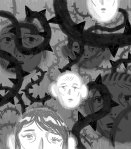Audre Lorde and Evette Dionne (and others) have called self-care a radical act.
“Taking care of myself should be a priority, that there is nothing wrong with putting myself first and making sure that I am healthy. Because I am no good to anybody else when I am not good to myself,” Dionne says.
Fighting against an entrenched system of white supremacy is impossible if we don’t care for ourselves, both mentally and physically. This makes it even more troubling that health care professionals agree that there exists inequity in diagnosing and treating health issues in this country. This topic is explored in today’s reading: Why Health Care Is Different If You’re Black, Latino Or Poor.
Some disturbing lowlights:
- Black Americans experience 30 to 40% poorer health outcomes than white Americans.
- While overall access to health care has improved over the past decade, the rate of improvement across the U.S. has been slower for Black Americans, Latinos and low-income individuals.
- Compared to white Americans, the rate of hospitalization for patients with diabetes is three times higher for Black Americans.
- The death rate from breast cancer for Black women is 50% higher than for white women.
- Not only do 25% of Black Americans have elevated blood pressure compared to 10 percent of white Americans, but Black patients are 10% less likely to be screened for high cholesterol. The result is higher rates of heart failure and strokes for Blacks.
And it’s not just physical. There are also disparities in how we treat mental health for Black people. Listen as Ja’Nel Johnson interviews Monnica Williams, director of the Center for Mental Health Disparities at the University of Louisville:
If you’re interested in learning more about this topic, the video Depression in our World features a conversation with Bassey Ikpi (director of the Siwe Project), psychologist Dr. Jeff Gardere, and Terrie Williams, author of “Black Pain: It Just Looks Like We’re Not Hurting.”

Richie Pope
Finally, take a moment to read the powerful op-ed by Ekow Yankah: When Addiction Has a White Face. Yankah explores the vastly different ways media and society responded to two addiction crises, one for crack-cocaine (often associated with the Black community), the other for heroin, which has recently afflicted predominantly white Americans. Black people were cast as “pathological” and “unsympathetic” masses in the 1980s, and responded to with militarized policing. Nowadays, police chiefs are urging officers to get people into rehab.
“We do not have to wait until a problem has a white face to answer with humanity,” Yankah writes.
Part of this stems from today’s vocabulary word: implicit bias. Implicit bias refers to the unconscious stereotypes or attitudes we carry with us that shade our understanding of others’ experiences and affect decisions in how we interact with people. Implicit bias can include positive or negative ideas, and it is important to remember that no one is immune. Everyone has them, even people that claim (or try) to be impartial. They can also change depending on experiences or exposure to certain ideas. Learn more about how implicit bias can affect health care and take an implicit bias test to learn more about the subconscious beliefs you hold.